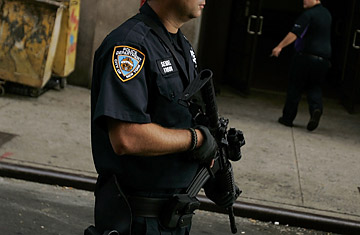
A police officer keeps watch on a street in New York City
(2 of 2)
You write that Sept. 11 has become a "cloak" for the NYPD. Has it been exploiting the tragedy?
Yes, I do think that. The fear of terrorism has definitely become a cloak hiding all sorts of problems. Because of the lack of transparency and critical reporting, we do not know what the NYPD is doing in its spying on individuals and on groups that they perceive could have a terrorism connection.
You've faced fierce pushback from the department's top brass for your reporting. Officers have been warned to stay away from you, and your picture was even posted at police headquarters. Why do people risk so much to continue talking to you?
They had my mug shot up at the security desk as a terrorism threat. It's kind of amusing, but at the same time kind of chilling. People talk because the department is so closed, and the mainstream media is so cowed that information they want public is not getting out. When people in the police department talk to a reporter, it's usually not for some lofty motive — it's usually because of a personal grudge. But the information they give to me is on the money and extremely important.
You say Frank Serpico, the corruption-fighting officer portrayed by Al Pacino in the 1973 movie, is the only pure whistle-blower you've seen.
In my experience he was the only person who did this out of genuinely altruistic motives.
There's a surprising amount of vindictiveness within the department. Just one example: officers are given "highway therapy" — assignments extremely far from their homes — as punishment for angering the wrong people. Is that sort of thing particular to the NYPD?
I think it's policing in general. It's very vindictive and retaliatory.
You left Newsday in 2005 and now write your column online. Do you think there's a viable future for investigative reporting on the Internet?
I think, ironically, I'm having more of an influence now than I ever had at Newsday. There are so many disaffected people who want an outlet, and the mainstream media is not doing the job that it should be doing. I could not have succeeded without the Internet, without access to all that information or without people being able to contact me so easily.
The spread of video cameras and the rise of YouTube have not been very good for police officers' public image. The cable news channels love playing footage of police misconduct, including that of an NYPD officer who was prosecuted for shoving a bicycle rider in Times Square. Are officers learning to behave better?
I don't know if it's dawned on them yet, but they certainly should be. The NYPD is like a battleship. You don't turn it around very quickly.
